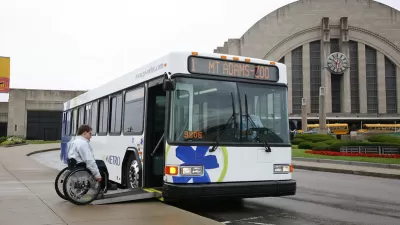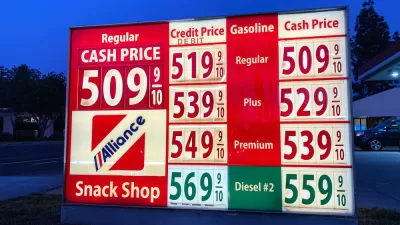As gas prices inch beyond $4 a gallon, transit trips increase by 3.3% for the first quarter of the year and vehicle miles traveled drop 4.3% in March.
"Americans took 2.6 billion trips on all modes of public transportation, including subways and buses, in the first three months of 2008, a 3.3 percent increase, or almost 85 million more trips than in the same period last year, according to a report released Monday by the American Public Transportation Association (APTA).
"There's no doubt that the high gas prices are motivating people to change their travel behavior," says William Millar, APTA president.
The ridership increase is noteworthy because it occurred when the economy was declining, said APTA, a transportation industry group. Sixty percent of transit trips are work-related, so for ridership to jump when the economy is flat or on the decline signals an increase in demand that is likely to continue if gas prices remain high, said Rob Padgette, APTA's director of policy, development and research. "It is a significant number," he said.
Even more noteworthy, Padgette said, is that ridership at many transit agencies increased despite higher fares...
That's a stunning thing and says to us that demand is there even if we raise fares," Padgette said, referring to the national statistics. "We haven't had this situation before where the ground is shifting underneath us. Fuel prices are at a totally different level than ever before, and we are facing surging demand."
"The U.S. Transportation Department reported last month that in March, Americans drove 11 billion fewer miles than in March 2007, a decline of 4.3 percent and the first time since 1979 that traffic has dropped from one March to the next."
"Of all modes, bus transit showed the lowest ridership increase - 2 percent nationwide."
While ridership jumps, some transit agencies and state budgets have reduced transit funding. In California, Gov. Schwarzenegger has shifted $1.4 billion from the Public Transportation Account to the general fund to help balance a state budget deficit that exceeds $17 billion. [See related link].
Thanks to ABAG-MTC Library
FULL STORY: More Travelers Are Turning to Public Transit

Planetizen Federal Action Tracker
A weekly monitor of how Trump’s orders and actions are impacting planners and planning in America.

Maui's Vacation Rental Debate Turns Ugly
Verbal attacks, misinformation campaigns and fistfights plague a high-stakes debate to convert thousands of vacation rentals into long-term housing.

Restaurant Patios Were a Pandemic Win — Why Were They so Hard to Keep?
Social distancing requirements and changes in travel patterns prompted cities to pilot new uses for street and sidewalk space. Then it got complicated.

In California Battle of Housing vs. Environment, Housing Just Won
A new state law significantly limits the power of CEQA, an environmental review law that served as a powerful tool for blocking new development.

Boulder Eliminates Parking Minimums Citywide
Officials estimate the cost of building a single underground parking space at up to $100,000.

Orange County, Florida Adopts Largest US “Sprawl Repair” Code
The ‘Orange Code’ seeks to rectify decades of sprawl-inducing, car-oriented development.
Urban Design for Planners 1: Software Tools
This six-course series explores essential urban design concepts using open source software and equips planners with the tools they need to participate fully in the urban design process.
Planning for Universal Design
Learn the tools for implementing Universal Design in planning regulations.
Heyer Gruel & Associates PA
JM Goldson LLC
Custer County Colorado
City of Camden Redevelopment Agency
City of Astoria
Transportation Research & Education Center (TREC) at Portland State University
Jefferson Parish Government
Camden Redevelopment Agency
City of Claremont





























